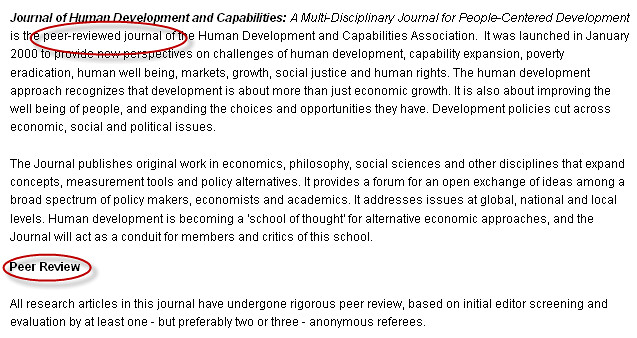The content below comes from the guide: Scholarly Articles: How can I tell?
A scholarly or research article is an article that presents the findings of a study, research or experimentation. This type of article is written by experts in a discipline for other experts in the discipline. Scholarly articles are considered more reliable than most other sources because the results are based on research not conjecture or opinion.
When you are doing research, you will probably want to use scholarly journal articles. It will depend a little on the assignment but in many situations, you will need to find research (or scholarly) articles. So it is important that you can identify a scholarly journal. The video below is about identifying a scholarly journal article.
Created by Amanda Dinscore
Peer review refers to the process where researchers submit a paper they have written to a journal. The journal editor then sends the article to the author's peers (researchers and scholars) who are in the same discipline for review. The reviewers determine if the article should be published based on the quality of the research, including the validity of the data, the conclusions the authors' draw and the originality of the research. This process is important because it validates the research and gives it a sort of "seal of approval" from others in the research community.
If you have a print edition of a journal, you can often determine if the journal is peer-reviewed. Print journals usually contain instructions for authors, including the journal's peer review policy, inside the front or back covers or in a page near the end of the issue.
However, one of the best places to find out if a journal is peer-reviewed is to go to the journal website. Most publishers have a website for a journal that tells you about the journal, how authors can submit an article, and what the process is for getting published.
On the journal website, look for the link that says information for authors, instructions for authors, submitting an article or something similar.

Another place to find out if the journal is peer-reviewed is to use one of the online databases.
For example, if you know that articles from your journal appear in the Academic Search Complete database, you can search for the journal in the database and learn more about it.
Go to Academic Search Complete and click on Publications below the search boxes. Enter the name of the publication you're interested in.

Choose your journal, then see if it has a "peer reviewed" tag assigned.

Academic Search Complete does not include all journals so the one you are looking for may not be listed here. You can also try searching for your journal in Wikipedia to see if the entry indicates if the journal is peer reviewed.
One of the best places to find out if a journal is peer-reviewed is to go to the journal's website (just Google the journal title).
Most publishers have a website for a journal that tells you about the journal, how authors can submit an article, and what the process is for getting published.
If you find the journal's website, look for the link that says "information for authors," "instructions for authors," "submitting an article" or something similar.

Another way to determine a journal's peer review status is with Ulrichsweb, which uses the term "refereed". Most larger public and academic libraries have access. Members of the OSU community can access Ulrichsweb using the link below.
Scholarly, peer-reviewed, original (empirical) research articles are research articles that have been evaluated and approved by other experts in the discipline (the process of peer-reivew) before being accepted for publication in a journal. They almost all follow a predictable pattern and contain the following elements:
1. AUTHOR: The author(s) is always listed with the credentials that identify the author's expertise, such as university or research affiliation or the author's academic degree. Contrast this to news articles where the author may or may not be identified (and affiliation or academic credentials are not identified).
2. CONTENT: There is an abstract at the beginning of the article which summarizes the content. The article almost always follows the pattern of having these sections: introduction, methods, results, discussion, conclusion, and references. News articles, scientific letters and book reviews do not follow this pattern.
3. ORIGINAL DATA: Usually, original data will be presented in as charts and graphs illustrating the results of experiments. Contrast this to a news feature, which pulls together results and ideas from other researchers' work. EXCEPTION - Reviews can also be peer reviewed. While they do summarize other researchers' work, authors of a review also add their own summary and repackage the work in a new way to help demonstrate something that is original.
4. LANGUAGE: The article language tends to be formal and technical, and is particular to the discipline in which it is written. It is geared to other researchers in the same subject. Contrast this with popular articles that are written at an informal and basic level for easy understanding by the general public.
